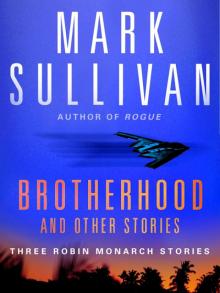- Home
- Mark Sullivan
Beneath a Scarlet Sky: A Novel Page 35
Beneath a Scarlet Sky: A Novel Read online
Page 35
“Them, too. We need a clean slate if we’re going to start over.”
Pino shook his head. Mimo was barely sixteen and yet a battle-hardened veteran.
“Don’t get killed before it’s over,” Pino said.
“You, either,” Mimo said, slipping from the car and into the shadows.
Pino twisted around in his seat, trying to spot his brother leaving, but he saw nothing. It was as if Mimo were a ghost.
That made Pino smile, and he started General Leyers’s car, feeling good about things for the first time in days, at least since he’d last seen Anna.
Pino’s heart soared as he parked in front of Dolly’s apartment around eight that evening. Giving the old crone in the lobby a wave, he climbed the stairs to the third floor and knocked eagerly on Dolly’s door.
Anna answered, smiling. She pecked him on the cheek, whispered, “Dolly’s upset. The general hasn’t been here in almost four days.”
“He’s coming back tonight,” Pino said. “I’m sure of it.”
“Please tell her that,” Anna said, and shooed him down the hall.
Dolly Stottlemeyer was on the couch in the living area, dressed in one of Leyers’s white tunics and little else. She had whiskey neat in a tumbler with ice, and she looked like it wasn’t her first or second, or even fifth of the day.
Seeing Pino, Dolly set her jaw for a woman scorned and said, “Where is my Hansie?”
“The general’s at Wehrmacht headquarters,” Pino said.
“We were supposed to be in Innsbruck by now,” Dolly said, slurring.
“The pass opens tomorrow,” Pino said. “And he told me just the other day that’s where he was moving you.”
Tears welled up in Dolly’s eyes. “He did?”
“I heard him.”
“Thank you,” Dolly said, and her hand trembled as she raised her glass. “I didn’t know what was to become of me.” She sipped the whiskey, smiled, and got up. “You two go on now. I need to make myself pretty.”
Dolly lurched by them and held on to the wall before disappearing down the hall.
When they heard her bedroom door slam shut they went to the kitchen. Pino spun Anna around, picked her up, and kissed her. Anna threw her legs up around him and kissed him back with equal ardor. When at last their lips separated, she said, “I have food for you. The sausage and broccoli dish you like, and bread and butter.”
Pino realized he was starved, put her down reluctantly, and said quietly, “God, I’ve missed you. You can’t know how good it is to be here with you right now.”
Anna beamed at him. “I didn’t know it could be like this.”
“I didn’t, either,” Pino said, and kissed her again and again.
They ate hot sausages and broccoli sautéed in garlic and olive oil, along with bread and butter, and drank more of the general’s wine before slipping off to Anna’s room after hearing the knock at the front door and Dolly’s cry of not to worry, that she would get it. In the heat, in her small room in the dark, Anna’s scent was everywhere around him, and he was instantly drunk on it. He peered for her shape in the pitch black, heard her bed springs creak, and went to her. When he lay by her side and reached out to find her body, Anna was already naked and wanting him.
There was a knock, and then another at the maid’s door.
Pino startled awake the morning of April 24, 1945, and looked around in confusion as Anna roused on his chest and called, “Yes?”
Dolly said, “It’s seven forty. The general needs his driver in twenty minutes, and we are to pack, Anna. The Brenner is clear.”
“We leave today?” Anna said.
“As soon as possible,” Dolly replied.
They lay there waiting for Dolly’s heels to clip down the hall to the kitchen.
Pino kissed Anna tenderly and said, “That was the most amazing night of my life.”
“Mine, too,” she said, staring into his eyes as if they held dreams. “I’ll never ever forget how magical it was.”
“Never. Ever.”
They kissed again, their lips barely touching. She inhaled when he exhaled, and exhaled when he inhaled, and Pino felt once again how like a single creature they were when they were like this, together.
“How will I find you?” Pino said. “In Innsbruck, I mean.”
“I’ll call your parents’ apartment once we get there.”
“Why don’t you just go to my parents’ apartment now? Or at least once you’ve got Dolly packed?”
“Dolly needs me to get settled,” Anna said. “She knows I want to come straight back to Milan as soon as possible.”
“Does she?”
“Yes. I told her she was going to have to hire a new maid.”
Pino kissed her, and they untangled and dressed. Before he went out the door, he took Anna in his arms and said, “I don’t know when I’ll see you again.”
“You’ll hear from me, I promise. I’ll call for you as soon as I can.”
Pino gazed into Anna’s eyes, stroked his powerful hands over her face, and murmured, “The war’s all but over. Will you marry me when you come back?”
“Marry?” she said, tears glistening in her eyes. “You’re sure?”
“More than sure.”
Anna kissed his palm and whispered, “Then, yes.”
Pino felt joy surge through him as powerful as a crescendo. “Yes?”
“Of course. With all my heart, Pino. With all my soul.”
“I know it’s corny,” Pino said, “but you’ve just made me the happiest, luckiest guy in all of Italy.”
“I think we’ve made each other happy and lucky,” she said, kissing him again.
Hearing the general’s boots in the kitchen already, Pino held her as long as he dared and whispered, “Our love will be eternal.”
“Forever and ever,” she said.
They parted. Pino took one last look at Anna, winked, and left with her beauty, her scent, and her touch dominating his mind.
General Leyers went first to Gestapo headquarters, emerging from the Hotel Regina an hour later. Then they drove to the telephone exchange, where Leyers disappeared inside for hours while another day of listless heat baked Milan.
Pino took refuge in the shade and noticed that everyone who walked by seemed on edge, as if they’d sensed a violent storm coming. He thought of Anna. When would he see her again? He felt hollow at the thought it might be a week, or a month. But what was time after the war? Infinite. And Anna said yes to his sudden proposal! She would love him for ever and ever. And he would love her for ever and ever. No matter what might happen, something was certain about his future now, and it calmed him.
Let not your heart be troubled, Pino thought, and basked in the sureness of being part of something bigger than himself, eternal. He was already envisioning a fantastic life for them, already falling in love with the miracles of what tomorrow might hold. He needed a ring, didn’t he? He could—
Pino realized that he was just a few blocks from the Piazzale Loreto and Beltramini’s Fresh Fruits and Vegetables.
Was Carletto there? How was his mother? He hadn’t seen his oldest friend in more than eight months, since he’d stumbled away from Carletto as he held his poor father’s dead body.
Part of Pino wanted to walk there from the telephone exchange and explain himself, but the fear that Carletto might not believe him kept him put, sweating, hungry, and sick of waiting around on the general’s whim. He would have Mimo go tell Carletto when the time was—
“Vorarbeiter!” General Leyers barked.
Pino jumped up, saluting and running toward the general, who was already at the back door of the Fiat, holding his valise, an impatient, annoyed look on his face. Pino apologized, blaming it on the heat.
Leyers looked up at the sky and the sun beating down on the city. “Does it always get like this in late April?”
“Non, mon général,” Pino said, relieved as he opened the door. “It’s very rare. Everything about the we
ather this year is very rare. Where do we go?”
“Como,” Leyers said. “We’ll be spending the night.”
“Oui, mon général,” Pino said, glancing in the rearview, where Leyers was rifling around his valise. “And when will Dolly and Anna go to Innsbruck?”
The general looked engrossed in something, didn’t look up. “They’re on their way by now, I should think. No more questions. I have work to do.”
Pino drove to Como and the stadium. Three days before, he’d seen the bonfire on the pitch. The ash was gone, and there were several companies of Organization Todt soldiers and officers encamped on the field. They’d put up tarps over sections of the grandstands and lounged under them in the shade, as if they were on holiday.
When Leyers went inside, Pino curled up in the front seat of the Fiat. But by the raucous noise echoing from the stadium, he figured the German soldiers were drinking. Leyers was probably in there with them. They lost, but the war was over, or would be any day now. That was cause enough for any man to get drunk, he supposed, and fell into a deep sleep.
Pino woke the next morning, Wednesday, April 25, 1945, to the sound of knuckles rapping against the Fiat’s passenger window. He was surprised the sun had risen. He’d slept soundly, dreamed of Anna, and—
The car door opened. An OT soldier said General Leyers needed him inside.
Pino got up, ran his fingers through his hair, looked at himself in the mirror. Grimy, but okay. He followed the soldier inside Leyers’s headquarters and down a series of halls to a room with a glass window that overlooked the pitch.
The general was dressed in civilian clothes and drinking coffee with a short man with jet-black hair and a narrow black mustache. He turned to look at Pino and nodded.
“You prefer English or Italian?” the man said in an American accent.
Pino, who towered over him, said, “English is fine.”
“Max Corvo,” he said, and stuck out his hand.
Pino hesitated, but then shook it. “Pino Lella. Where are you from?”
“America. Connecticut. Tell the general here that I’m with the OSS, the Office of Strategic Services, and that I represent Allen Dulles.”
Pino hesitated, but then translated it into French for the general, who nodded.
Corvo said, “We want your assurance that your men will remain in their barracks, General Leyers, and offer zero resistance if they are asked to lay down their arms.”
Pino translated. Leyers nodded. “When there’s a deal in place, signed by Field Marshal Vietinghoff, my men will comply. And tell him I continue to work to save Milan from destruction.”
“The United States of America appreciates that, General Leyers,” Corvo said. “I think there’ll be something on paper and signed in less than a week, maybe even sooner.”
Leyers nodded. “Until then. Wish Mr. Dulles my best.”
Pino translated, and then added, “He has been burning documents across northern Italy for the past three days.”
Corvo cocked his head. “That true?”
“Yes,” Pino said. “They’re all burning documents. All of them.”
“Okay,” the OSS agent said. “Thanks for telling me.”
Corvo shook the general’s hand, and Pino’s, and then he was gone.
Pino stood there for several awkward moments before Leyers said, “What were you saying there just before he left?”
“I asked him what Connecticut was like, and he said it was nowhere as beautiful as Italy.”
The general studied him. “Let’s go. I have an appointment with Cardinal Schuster.”
When they drove back into the city at two that afternoon, Milan felt electric and rebellious. Factory whistles were blowing. Conductors and drivers were walking away from the remaining trolley cars and buses, creating havoc for the German convoys trying to forge through the city on their way north. When Pino was stopped at a crossing, he swore he heard the crackle of rifle fire in the distance.
That caused him to glance at General Leyers in the backseat and think about the satisfaction he’d take in arresting the Nazi and telling him he’d been a spy all along. Where should I do it? And how? In the car? Or on the road somewhere?
The closer they got to the Duomo, the more Nazis they saw. Most were Waffen-SS, the killers, the rapists, the plunderers, and the slave guards. They were in the streets all around Gestapo headquarters, taking refuge behind the Panzer tanks in and around the cathedral and the chancellery, where Pino parked outside the gates because there were too many cars in the courtyard already.
Pino followed Leyers toward the stairs. A priest intercepted them. “His Eminence is seeing you in his office today, General.”
When they entered Schuster’s ornate formal offices, the cardinal of Milan sat behind his desk like a judge wearing white robes, his red miter on the shelf behind him. Pino took in the crowded room. Giovanni Barbareschi, the seminarian, stood off the cardinal’s left shoulder. Nearest to them was Eugen Dollmann, Hitler’s Italian translator. Beside Dollmann stood SS General Wolff and several men in business suits Pino did not know.
Seated at the far left side of the cardinal’s desk, balancing on a cane, was an angry old man whom Pino would not have recognized had his mistress not been sitting next to him. Benito Mussolini looked twisted inside and out, like a spring that had been overwound and sprung. His skin pale and sweaty, the puppet dictator had lost weight and was hunched forward as if against stomach pain. Claretta Petacci stroked Il Duce’s hand idly and leaned against him for comfort.
Behind Mussolini and his mistress there were two men wearing red neckerchiefs. Partisan leaders, Pino thought.
“Everyone you asked to be here is here, Your Eminence,” Barbareschi said.
Schuster eyed them all. “Nothing said here leaves this room. Are we in accord?”
One by one they all nodded, including Pino, who wondered why he was even in the room with Dollmann there to translate.
“Our goal, then, is to save Milan further suffering and limit the amount of German blood spilled as they retreat. Yes?”
Mussolini nodded. After Dollmann translated, Wolff and Leyers did, too.
“Good,” the cardinal said. “General Wolff? What can you report?”
“I’ve been to Lugano twice in the past few days,” the SS general said. “Negotiations are moving slower than expected, but moving. We’re three, maybe four days away from having a document to sign.”
Mussolini came up out of a stupor. “What document? What negotiations?”
Wolff glanced at the cardinal, then at General Leyers, who said, “Duce, the war is lost. Hitler has gone mad in his bunker. We have all been working to end the conflict with as little death and destruction as possible.”
Sitting there hunched over his cane, Mussolini went from ashen to beet red. Little bubbles of spittle showed at the corners of Il Duce’s lips, which squirmed before he thrust out his chiseled jaw and began shouting and waving his cane at Wolff and Leyers.
“You Nazi bastards,” Mussolini roared. “Once more we can say that Germany has knifed Italy in the back! I’ll go on the radio! I’ll tell the world of your treachery!”
“You’ll do no such thing, Benito,” Cardinal Schuster said.
“Benito?” Mussolini cried with indignation. “Cardinal Schuster, you will address me as ‘Excellency’!”
The cardinal took a long breath, and then bowed his head. “Excellency, it is important to reach an agreement of surrender before the masses rise up and revolt. If not, we will have anarchy, which I intend to prevent. If you are not committed to that goal, Duce, I’ll have to ask you to leave.”
Mussolini looked around the room, shook his head in disgust, put his hand out to his mistress. “Like how they treat us, Clara? We’re on our own now.”
Petacci took the Fascist leader’s hand and said, “I’m ready, Duce.”
They labored to their feet and started toward the door.
“Excellency,” Cardinal Schuster calle
d after him. “Wait.”
The prelate went to his shelves, pulled down a book, and handed it to Mussolini. “It’s a history of Saint Benedict. Repent your sins, and may you find comfort in this book in the sad days that are now on your horizon.”
Mussolini got a sour look about him, but took the book and handed it to his mistress. On the way out he said, “I should have them all shot.”
The door slammed shut behind them.
“Shall we proceed?” Cardinal Schuster said. “General Wolff? Has the German High Command agreed to my request?”
“Vietinghoff wrote me this morning. He has given orders for his men to stand down from offensive actions, to remain in barracks until they are contacted.”
“Not quite a surrender, but a start,” said Cardinal Schuster. “And there’s still a core group of SS here in the streets around the Duomo. They’re loyal to Colonel Rauff?”
“I would think so,” Wolff said.
“But Rauff answers to you,” Schuster said.
“At times.”
“Issue him an order, then. Forbid him and those monsters in uniform from perpetrating any more atrocities before they leave this country.”
“Atrocities?” Wolff said. “I don’t know what you’re—”
“Don’t insult me,” the cardinal of Milan snapped. “You will not be able to cover up the things done in Italy and to Italians. But you can prevent further massacres from happening. Are we in agreement?”
Wolff looked highly agitated but nodded. “I’ll write the orders now.”
Barbareschi said, “I’ll deliver them for you.”
Cardinal Schuster looked at the seminarian. “Are you sure?”
“I want to look the man who tortured me in the eye as he gets the news.”
Wolff scribbled the order on stationery, sealed it with Schuster’s wax, and put his ring into the wax before handing it to the seminarian. As Barbareschi was leaving, the priest who’d led them in returned and said, “Cardinal Schuster, the prisoners of San Vittore are rioting.”

 Beneath a Scarlet Sky
Beneath a Scarlet Sky The Last Green Valley
The Last Green Valley Beneath a Scarlet Sky: A Novel
Beneath a Scarlet Sky: A Novel Brotherhood and Others
Brotherhood and Others The Purification Ceremony
The Purification Ceremony